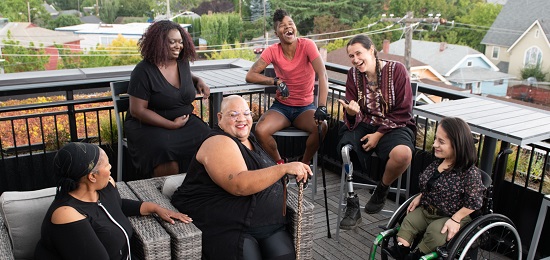Dispute Resolution
Successful Mediations
The Dispute Resolution Division (DRD) is on the cutting edge of developing and implementing solutions to address alleged violations of California’s robust civil rights laws. Each year, DRD resolves hundreds of complaints by bringing parties together in a confidential setting to cooperatively address conflict outside of the court system. These mediations also result in millions of dollars in relief for impacted Californians. By mediating complaints, DRD brings healing, closure, and resolution to problems that otherwise could have resulted in months or years of investigation, litigation, and conflict. Below are a few key examples of DRD’s successful work to help resolve civil rights issues across the state.
Bringing Reasonable Accommodations to Farmworkers with Disabilities
A farmworker came to the Civil Rights Department (CRD) alleging that she had been unlawfully terminated from her work because she had a temporary disability that resulted from a workplace injury. CRD investigated the complaint on behalf of a group of similarly situated employees of a farm labor contractor. The parties mediated the complaint through DRD, resulting in a major settlement. Without litigation, the parties agreed to the creation of a $550,000 settlement fund to compensate impacted workers who do the essential work of planting, harvesting, and packaging our food. Additionally, the settlement ensured the contractor would adopt procedures consistent with the requirements of California’s Fair Employment and Housing Act, including the right to reasonable accommodations and to participate in a meaningful interactive process. You can learn more about the settlement here.
Providing Relief to Address Alleged Misgendering in the Workplace
A transgender employee came to CRD complaining that his co-workers intentionally misgendered him and that his employer failed to take reasonable steps to correct the behavior. The employee ultimately quit the job and came to CRD to find a resolution. At CRD, the parties were able to come together and agree to a $20,000 monetary payment to the employee. In addition, the employer committed to making changes to the company’s policies designed to prevent future discrimination, harassment, and retaliation, including by providing additional training about discrimination based on gender identity and expression to managers and staff, and reporting to CRD all complaints of gender identity and gender expression discrimination or harassment from certain Bay Area locations for a one-year period. You can learn more about the settlement here.
Protecting a Tenant from Sexual Harassment at Her Apartment Complex
A tenant in an apartment building was allegedly subjected to ongoing sexual harassment and sought assistance from CRD. She alleged that that an employee of her apartment complex’s property management company physically and verbally harassed her, pressuring her for sexual intimacy and asking her children if she had a boyfriend. According to the complaint filed with CRD, when the tenant reported the harassment to the property management company, nothing was done. Even after she obtained a permanent restraining order against the employee, the harasser remained the emergency maintenance contact for the property. Through DRD, the parties engaged in a voluntary mediation, resulting in a $40,000 settlement for the tenant; fair housing training and reassignment of the harassing employee; the use of the fair housing materials in the company’s properties and advertisements; and acknowledgment of the civil harassment restraining order. You can learn more about the settlement here.
Helping Employers Understand their Obligations under California’s Fair Chance Act
A woman, years after having fought fires while in prison, was offered a job as an inspector at an East Bay fire protection district, but the offer was rescinded after the district learned she had a criminal record. In a complaint filed with CRD, the woman alleged that the district unlawfully rescinded the offer based on the applicant’s response to a criminal history questionnaire without considering important mitigating factors, the nature of the offense, the time that had passed since the offense, and whether the offense was related to the job being sought. The settlement provided $97,500 in monetary relief to the complainant and, among other things, required the district to conduct a comprehensive review of its anti-discrimination policies and revise them in accordance with the law as necessary, and train all managers, supervisors, and human resources professionals on anti-discrimination obligations, with a particular emphasis on requirements under the Fair Chance Act. You can learn more about the settlement here.
Changing County Practices Around Reasonable Accommodation of Disability
A San Joaquin County employee filed a complaint with CRD alleging the unlawful denial of reasonable accommodations for the use of orthotic sandals for several months and retaliation, including the county issuing the employee a written reprimand and requiring more information beyond what was contained in a previously submitted medical certification. The settlement reached through CRD’s dispute resolution process included a $375,000 payment to the complainant and other forms of proactive relief, requiring the office to ensure that all managers and human resources personnel received training on state civil rights laws, review and certify that the office’s current policies for maintaining a workplace free from harassment and discrimination are aligned with state law, and post CRD informational materials in a common area. You can learn more about the settlement here.
Relief for Prospective Tenant Alleging Denial of Reasonable Modifications to Apartment
A prospective tenant filed a complaint with CRD alleging that a property management company and an individual property owner denied the prospective tenant reasonable modifications to make an apartment unit accessible. The complaint alleged that the company sought to unlawfully require the complainant to pay for tens of thousands of dollars of work that extended beyond the complainant’s requested modifications. The settlement provided for a $40,000 payment to the complainant and required the company and the property owner to adopt a written policy to implement lawful procedures for all future requests for reasonable accommodations and modifications, and to take a fair housing training on all applicable federal and state laws within 90 days. You can learn more about the settlement here.









